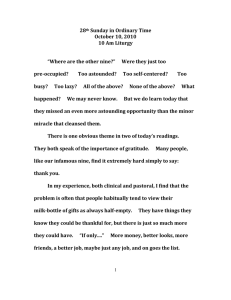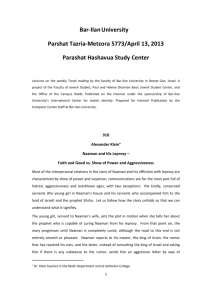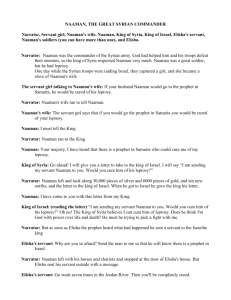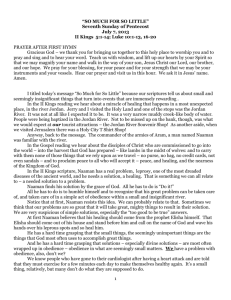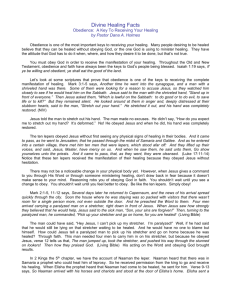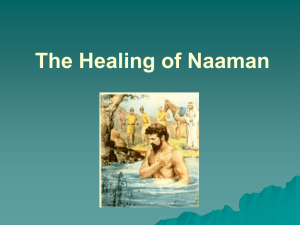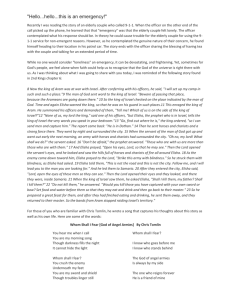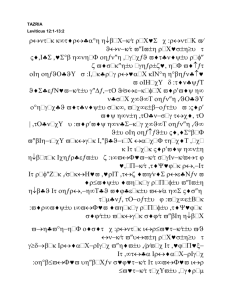The Simplest Thing
advertisement
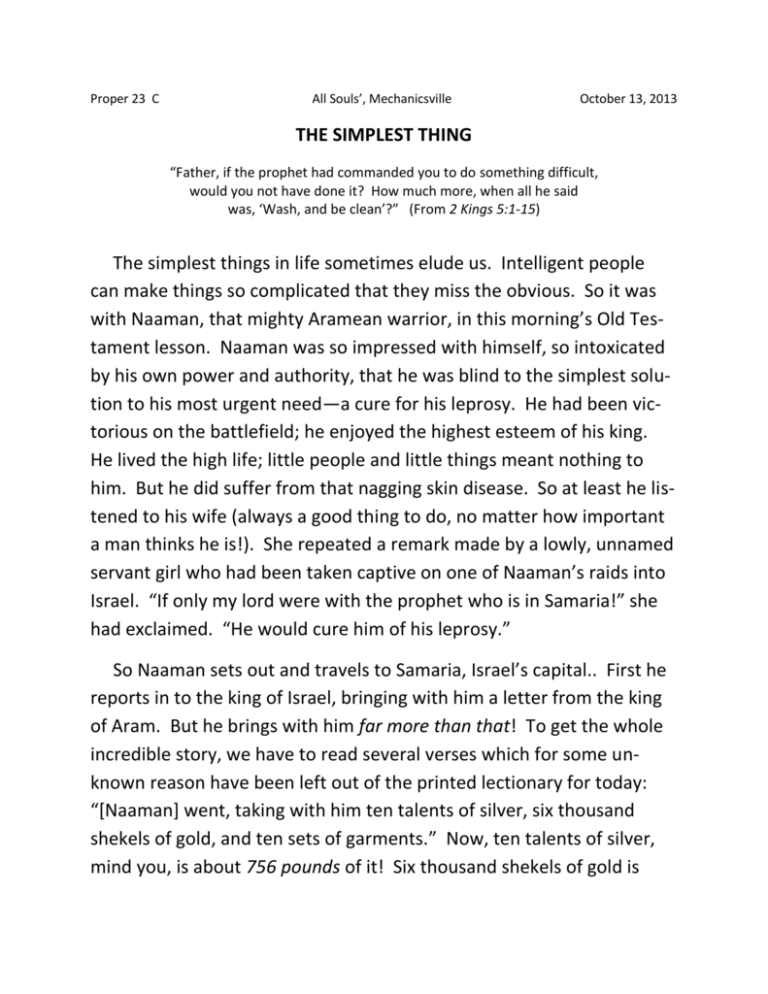
Proper 23 C All Souls’, Mechanicsville October 13, 2013 THE SIMPLEST THING “Father, if the prophet had commanded you to do something difficult, would you not have done it? How much more, when all he said was, ‘Wash, and be clean’?” (From 2 Kings 5:1-15) The simplest things in life sometimes elude us. Intelligent people can make things so complicated that they miss the obvious. So it was with Naaman, that mighty Aramean warrior, in this morning’s Old Testament lesson. Naaman was so impressed with himself, so intoxicated by his own power and authority, that he was blind to the simplest solution to his most urgent need—a cure for his leprosy. He had been victorious on the battlefield; he enjoyed the highest esteem of his king. He lived the high life; little people and little things meant nothing to him. But he did suffer from that nagging skin disease. So at least he listened to his wife (always a good thing to do, no matter how important a man thinks he is!). She repeated a remark made by a lowly, unnamed servant girl who had been taken captive on one of Naaman’s raids into Israel. “If only my lord were with the prophet who is in Samaria!” she had exclaimed. “He would cure him of his leprosy.” So Naaman sets out and travels to Samaria, Israel’s capital.. First he reports in to the king of Israel, bringing with him a letter from the king of Aram. But he brings with him far more than that! To get the whole incredible story, we have to read several verses which for some unknown reason have been left out of the printed lectionary for today: “[Naaman] went, taking with him ten talents of silver, six thousand shekels of gold, and ten sets of garments.” Now, ten talents of silver, mind you, is about 756 pounds of it! Six thousand shekels of gold is about 151 pounds of that precious metal! We’re not talking about small change here! Naaman makes his servants load up over 900 pounds of silver and gold. Then the letter from the king of Aram to the king of Israel—it reads: “When this letter reaches you, know that I have sent to you my servant Naaman, that you may cure him of his leprosy.” Back now to the printed lectionary: here’s the king’s reaction: He thinks the whole thing is a ploy, a trick! Aram and Israel have had a long history of distrust and hostility. It is beyond suspicious that a prominent Aramean general would show up in Samaria with a letter like this for the king, and an unbelievably generous gift for the famous prophet, whom he hopes to persuade to heal his leprosy! The king almost has a stroke! He tears his clothes and cries out, “Am I God, to give death or life, that this man sends word to me to cure a man of his leprosy? Just look and see how he is trying to pick a quarrel with me.” Now comes the climax—now we learn how a remark—just a simple remark--could stop a proud man dead in his tracks, and prick his bubble, and transform his life. Somehow, Elisha hears that Naaman has arrived in Israel, and the king is all upset. He sends the king a message: “Why have you torn your clothes? Let him come to me, that he may learn that there is a prophet in Israel.” So Naaman, the powerful Aramean warrior, arrives at Elisha’s house, with his horses, his chariots, his servants, and his gifts: 756 pounds of silver and 151 pounds of gold. And what does Elisha do? Elisha doesn’t even come to the door! He simply sends a messenger out to tell Naaman, “Go, wash in the Jordan seven times, and your flesh shall be restored and you shall be clean.” Naaman is apoplectic—you just don’t treat an important man like Naaman that way! He erupts in rage, turns angrily away and says, “T thought that for me (did you get that—“for me”—he’s accustomed to preferential treatment!) he would surely come out, and stand and call on the name of the Lord his God, and would wave his hand over the spot, and cure the leprosy! Are not…the rivers of Damascus better than all the waters of Israel? Could I not wash in them, and be clean?” Now, see what happens: As he huffs and puffs in rage, once again it’s a couple of lowly, unnamed servants who change the life of a celebrated general: “Father,” they say, “if the prophet had commanded you to do something difficult, would you not have done it? How much more, when all he said to you was, ‘Wash, and be clean’?” The proud warrior’s bubble is pricked: he goes down to the Jordan River and immerses himself seven times, just like Elisha ordered. And as he comes up onto the riverbank, dripping wet, probably feeling silly and humiliated, suddenly he discovers that he has been healed. “His flesh was restored,” says the text, “like the flesh of a young boy, and he was clean.” Something so simple: a quiet word of counsel from a lowly servant to a proud, self-important general—but that’s the way God so often works. Our job is to listen—to listen to the whisperings of God in our hearts, through an unexpected encounter, a remark dropped by a friend, a coincidence we look back upon and see there the hand of God. I was feeling very proud of myself many years ago after receiving my commission as a Coast Guard officer. Resplendent in my new uniform, I was behind the wheel of my car on my way to an important meeting, when suddenly another car cut in front of me and we almost crashed. I was very mad, and very immature, and determined to show off my authority. So I followed that car: wherever it went I went; wherever it turned I turned. Finally it pulled into the driveway of a house—and I pulled in right behind it! The driver got out, and I got out—and gave him a piece of my mind! But he was older and wiser than I. In a quiet voice, he pricked my bubble. He simply said, “I am so sorry. You are absolutely right—I was careless; I cut you off. I do apologize.” With that simple word he cut me down to size. And I did a little growing up. After stints in the Coast Guard and the insurance business, I had a three-year stint as a theological student. I learned a lot about God and the Bible and the Church and the Christian Faith, and how to be a priest. But one of the most valuable things I learned, for my soul’s health, was the importance of listening to people. A simple remark by a professor has stayed with me: “Just remember, whatever you don’t say can’t be held against you!” We love others when we’re good listeners. After I graduated and was ordained and was called to a parish out West, I felt like God’s great gift to the Diocese of Eastern Oregon! I needed to be cut down to size again, and God did that through a parishioner named Bill Peterson, who owned a furniture store in town and was a vestryman at our church. One weekend it was my parish’s turn to host the annual diocesan convention. Episcopalians came from fifteen or so little churches in that vast rural area; and I raced around frantically like a self-important rector feeling responsible for every detail—until my friend Bill pricked my bubble with a simple piece of advice: “Doug,” he said, “take it easy; trust other people; it doesn’t all depend on you!” Looking back, I knew that was a word from God. There’s a little of Naaman, that anxious, arrogant Aramean, in us all. And it’s all about fear. We fear we must go to extravagant lengths to prove our worth to others; whereas what God asks of us is the simplest thing—just to be ourselves as God has made us, to accept ourselves as God accepts us, and to love others as God loves and accepts them.

